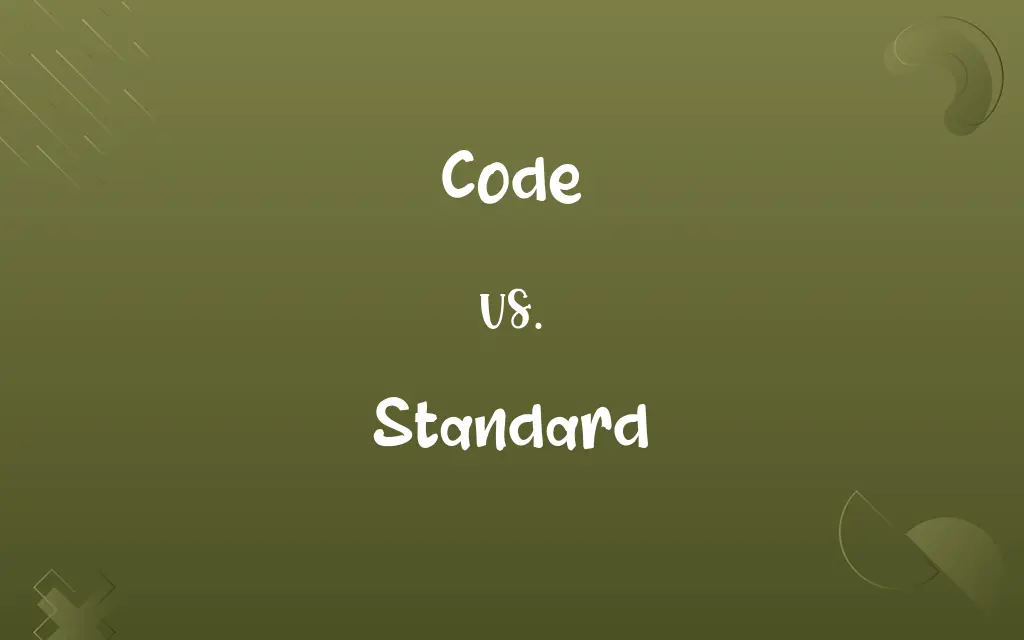Code vs. Standard: Know the Difference

By Dua Fatima & Hifza Nasir || Published on November 26, 2024
A code is a set of rules and specifications for processes and design, while a standard is a guideline that ensures quality, safety, and efficiency.

Key Differences
Codes are regulatory requirements that define how specific tasks must be carried out or how products should be designed to meet safety, health, and environmental protection standards. They are legally enforceable in many jurisdictions and must be followed to obtain approvals for construction and manufacturing processes. Standards, on the other hand, are agreed-upon specifications within an industry to ensure quality, safety, and efficiency. While adherence to standards is generally voluntary, they are often adopted by industries to maintain consistency, facilitate interoperability, and meet customer expectations.
Hifza Nasir
Nov 26, 2024
Standards often serve as benchmarks for best practices within industries, providing guidelines on the minimum acceptable requirements for processes, systems, or materials. They are developed by standardization organizations through consensus among experts and are designed to be applied universally. Codes, however, are more prescriptive and specific, detailing exactly what must be done to comply with legal and safety requirements. They are typically developed by government bodies or authorized organizations and have a narrower scope of application, focusing on compliance rather than optimization.
Dua Fatima
Nov 26, 2024
The development process for codes and standards also differs significantly. Codes are usually developed with input from public and private stakeholders, including government agencies, to address specific safety and regulatory concerns. This process is often lengthy, involving public hearings and revisions before adoption. Standards, however, are developed through consensus among industry professionals and experts, which allows for more flexibility and quicker updates to reflect technological advancements and industry practices.
Dua Fatima
Nov 26, 2024
Compliance with codes is mandatory where they apply, as they are integrated into legal and regulatory frameworks. Non-compliance can result in legal penalties, including fines and cessation of operations. Standards, while not legally binding, become de facto requirements in many industries, as compliance is often necessary to meet market demands, achieve certification, and ensure product compatibility.
Hifza Nasir
Nov 26, 2024
Both codes and standards play critical roles in various industries, but their importance and application can vary. For instance, in the construction industry, building codes specify the minimum requirements for construction practices and materials, while construction standards might outline the quality and performance criteria for those materials. In technology and manufacturing, codes might dictate safety requirements for electrical systems, whereas standards could define the interoperability specifications for electronic devices.
Shumaila Saeed
Nov 26, 2024
ADVERTISEMENT
Comparison Chart
Nature
Regulatory and legally enforceable rules
Voluntary guidelines for quality and efficiency
Dua Fatima
Nov 26, 2024
Purpose
Ensure safety, health, and environmental protection
Ensure quality, safety, and interoperability
Dua Fatima
Nov 26, 2024
Development
By government bodies or authorized organizations
By industry groups or standardization bodies
Dua Fatima
Nov 26, 2024
Compliance
Mandatory and subject to legal enforcement
Voluntary, but often essential for market acceptance
Hifza Nasir
Nov 26, 2024
ADVERTISEMENT
Code and Standard Definitions
Code
A set of rules and specifications that must be followed to ensure safety, compliance, and efficiency in processes and designs.
The building code requires all structures to withstand certain wind speeds.
Hifza Nasir
Mar 05, 2024
Standard
Non-compliance might result in loss of marketability.
Failing to meet industry standards can make a product less competitive.
Shumaila Saeed
Mar 05, 2024
Code
Updated through legal processes, which can be slow.
The plumbing code is revised every few years to incorporate new safety standards.
Dua Fatima
Mar 05, 2024
Standard
A guideline or benchmark for best practices that ensures the quality, safety, and efficiency of products, services, and systems.
The ISO 9001 standard defines the criteria for a quality management system.
Hifza Nasir
Mar 05, 2024
Code
Aimed primarily at protecting public health, safety, and the environment.
Electrical codes prevent hazards by setting standards for wiring installations.
Hifza Nasir
Mar 05, 2024
ADVERTISEMENT
Standard
Compliance is generally voluntary but critical for market acceptance.
Manufacturers adopt the HDMI standard to ensure device compatibility.
Dua Fatima
Mar 05, 2024
Code
Codified laws or regulations that dictate specific requirements.
Fire safety codes dictate the use of flame-retardant materials in public buildings.
Dua Fatima
Mar 05, 2024
Standard
Designed to improve quality and operational efficiency.
Environmental standards help companies reduce their ecological footprint.
Hifza Nasir
Mar 05, 2024
Code
Failure to adhere can result in legal penalties.
Violating a building code can halt construction projects and lead to fines.
Hifza Nasir
Mar 05, 2024
Standard
Regularly updated to reflect new technologies and practices.
Wi-Fi standards evolve to accommodate faster data transmission rates.
Dua Fatima
Mar 05, 2024
Code
A system of signals used to represent letters or numbers in transmitting messages.
Dua Fatima
Mar 05, 2024
Standard
Widely recognized or employed as a model of authority or excellence
A standard reference work.
Dua Fatima
Mar 05, 2024
Code
A system of symbols, letters, or words given certain arbitrary meanings, used for transmitting messages requiring secrecy or brevity.
Dua Fatima
Mar 05, 2024
Code
A special command, such as a sequence of keystrokes, that allows a user to activate a hidden or accidental feature in a computer program or video game.
Shumaila Saeed
Mar 05, 2024
Standard
An object that under specified conditions defines, represents, or records the magnitude of a unit.
Dua Fatima
Mar 05, 2024
Standard
Something, such as a practice or a product, that is widely recognized or employed, especially because of its excellence.
Dua Fatima
Mar 05, 2024
Code
A coding system used for transmitting messages requiring brevity or secrecy
Dua Fatima
Mar 05, 2024
Standard
A set of specifications that are adopted within an industry to allow compatibility between products.
Dua Fatima
Mar 05, 2024
Code
Convert ordinary language into code;
We should encode the message for security reasons
Hifza Nasir
Mar 05, 2024
Standard
A rule or set of rules or requirements which are widely agreed upon or imposed by government.
Dua Fatima
Mar 05, 2024
Standard
That which is established as a rule or model by authority, custom, or general consent; criterion; test.
The court, which used to be the standard of propriety and correctness of speech.
A disposition to preserve, and an ability to improve, taken together, would be my standard of a statesman.
Dua Fatima
Mar 05, 2024
Repeatedly Asked Queries
How are codes and standards developed?
Codes are developed by government or authorized bodies with legal implications, while standards are developed by industry groups or standardization bodies through consensus.
Dua Fatima
Nov 26, 2024
Do codes only apply to construction?
No, codes can apply to various sectors, including construction, electrical, plumbing, and more, focusing on safety and regulatory compliance.
Dua Fatima
Nov 26, 2024
Why are standards important?
Standards ensure quality, efficiency, and interoperability, facilitating trade and innovation.
Dua Fatima
Nov 26, 2024
Is compliance with standards mandatory?
Compliance with standards is generally voluntary but critical for market acceptance and interoperability.
Hifza Nasir
Nov 26, 2024
What is a code?
A code is a set of rules and specifications designed to ensure safety, compliance, and efficiency, often with legal enforcement.
Hifza Nasir
Nov 26, 2024
Are codes the same in every country?
No, codes vary by country and region based on local laws, regulations, and safety requirements.
Dua Fatima
Nov 26, 2024
Can a product comply with standards but not codes?
Yes, a product can meet voluntary standards but still fail to comply with mandatory codes, risking legal penalties.
Hifza Nasir
Nov 26, 2024
Are all codes legally enforceable?
Yes, in jurisdictions where they are adopted, codes are legally enforceable, with non-compliance resulting in penalties.
Dua Fatima
Nov 26, 2024
What is a standard?
A standard is a guideline or benchmark for best practices that ensures quality, safety, and interoperability, usually on a voluntary basis.
Dua Fatima
Nov 26, 2024
Why might a company choose to exceed standard requirements?
Companies may exceed standards to differentiate their products, enhance safety, or improve quality beyond the minimum requirements.
Hifza Nasir
Nov 26, 2024
How often are standards updated?
Standards are updated more frequently than codes to reflect technological advancements and industry practices.
Dua Fatima
Nov 26, 2024
Can standards become codes?
Standards can be adopted into codes, making compliance mandatory in certain jurisdictions.
Dua Fatima
Nov 26, 2024
Who enforces codes?
Government agencies or authorized organizations typically enforce codes.
Dua Fatima
Nov 26, 2024
What role do standards play in international trade?
Standards facilitate international trade by ensuring product compatibility and meeting global quality benchmarks.
Dua Fatima
Nov 26, 2024
How do codes impact product design?
Codes dictate specific design requirements that must be met for legal and safety compliance.
Dua Fatima
Nov 26, 2024
Share this page
Link for your blog / website
HTML
Link to share via messenger
About Author
Written by
Dua FatimaCo-written by
Hifza Nasir





































































